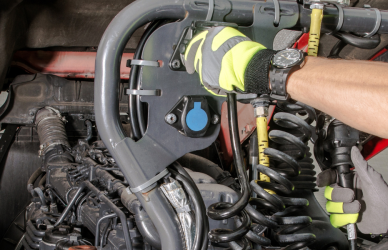The Owner-Operator Independent Drivers Association (OOIDA) is emphasizing the urgency for lawmakers to pass the DRIVE Act, a bill that would prohibit the Federal Motor Carrier Safety Administration (FMCSA) from imposing speed limiters on heavy-duty trucks.
In a letter addressed to House Republican offices on Feb. 20, OOIDA stressed the significance of prioritizing the DRIVE Act before addressing the potential reversal of the Biden administration’s new worker classification rule.
“As the House of Representatives considers a Congressional Review Act Resolution of Disapproval to overturn the Biden administration’s worker classification rule, we are writing to express our concerns about a provision in the Trump administration’s worker classification rule that would be imposed on owner-operators,” OOIDA wrote. “While we generally supported the 2021 Trump rule and believe it should allow for owner-operators to continue working as independent contractors, we strenuously objected to a provision slipped into the final rule that effectively enables large carriers to mandate that the independent truckers they contract with use dangerous speed limiters. This level of micromanagement flies in the face of independence.”
The DRIVE Act, introduced last year, aims to prevent the FMCSA from pursuing any rulemaking that mandates the use of speed-limiting devices on commercial motor vehicles. Despite strong opposition from truck drivers, the FMCSA is anticipated to unveil a proposal in May, advocating for speed limiters on most commercial motor vehicles.
Critics argue against the mandate, citing concerns about hazardous speed differentials and the encroachment on a state’s authority to establish speed limits. OOIDA is particularly concerned about large carriers compelling independent contractors to adopt technologies they consider unsafe. Therefore, the Association is urging lawmakers to prioritize passing the legislation before attempting to overturn the U.S. Department of Labor’s independent contractor rule.
“Thankfully, there is legislation introduced in the House – the DRIVE Act – to help alleviate this concern if it is passed before or along with the (Congressional Review Act Resolution),” OOIDA wrote. “Congress must do this if it really wants to preserve the viability of small-business truckers.”
Regarding the worker classification rule, the Department of Labor (DOL) introduced a final rule in January to prevent companies from misclassifying workers as independent contractors. This rule, set to take effect on March 11, replaces a Trump-era rule and offers guidance consistent with the Fair Labor Standards Act for analyzing employee or independent contractor classification.
OOIDA insists that any successful worker classification rule must preserve the business model of truly independent owner-operators and shield truck drivers from exploitative carriers. If Congress deems the new rule inadequate in striking the right balance, OOIDA advocates for preventing independent truckers from being compelled to equip their trucks with speed limiters.
“By passing HR3039 before moving a (Congressional Review Act Resolution), you can send a message that you truly support trucking’s independent contractors,” OOIDA wrote.
Source: Land Line











